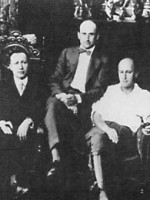Richard Bennett is a Actor, Director, Author and Script American born on 21 may 1870 at Deacon (USA)

Richard Bennett (May 21, 1870 – October 22, 1944) was an American actor who became a stage and silent screen matinee idol over the early decades of the 20th century. He was the father of actresses Constance Bennett, Barbara Bennett and Joan Bennett by his second wife, actress Adrienne Morrison.
Bennett made his stage debut May 10, 1891, in Chicago, in the The Limited Mail. He went to New York, where his Broadway debut was in His Excellency the Governor (1899), which was produced by Charles Frohman. In his third Broadway production, he played the role as Father Anselm in Frohman's production of A Royal Family (1901–02).
Bennett was married to Grena Heller in 1901 in San Francisco. They soon separated, and were divorced in 1903. Using her married name, she starred in a few plays on Broadway, and went on to a successful career as a music critic for Hearst's New York American.
On November 8, 1903, Bennett and actress Adrienne Morrison were married in Jersey City. They had three daughters, all notable actresses: Constance Bennett, Barbara Bennett and Joan Bennett.
In 1905, Bennett won fame as the leading man, Hector Malone, Jr., in Shaw's Man and Superman. That was followed by his role as Jefferson Ryder in the stage hit, The Lion and the Mouse (1905).
A series of spectacular roles followed. In 1908, he played the role as John Shand opposite Maude Adams in J. M. Barrie's What Every Woman Knows. Frequent quarrels between the stars occurred during the run of the play, and when Adams opened in Peter Pan, Bennett telegraphed his congratulations "on achieving your long ambition to be your own leading man."
Bennett is also known for adapting socially conscious works of Eugène Brieux, including Maternity.
In 1913, Bennett had a theatrical success starring as Georges Dupont in the social disease stage drama Damaged Goods, which he also co-produced. He won a reputation for his curtain harangues, which friends—and critics—said were at least as good as his stage portrayals when he wound up an appearance by stepping in front of the curtain and castigatigating the police and courts for "narrow-mindedness." He developed this penchant until his ab-lib speeches won greater applause than many of the plays in which he acted.
Bennett reprised his stage role for his feature film debut, Damaged Goods (1914), which co-starred his wife, Adrienne Morrison. He helped adapt the screenplay and direct the drama. In the drama The Valley of Decision (1916), which he wrote, Bennett appeared on the screen with his wife, Morrison, and his three daughters.
In 1922, Bennett starred in Broadway's English-language version of Leonid Andreyev's melodrama, He Who Gets Slapped, playing the title role as He. The success of the play led to a film adaptation by Metro-Goldwyn-Mayer, with Lon Chaney in Bennett's role.
Bennett and Morrison appeared together on stage in the 1923 play The Dancers. They were divorced in April 1925.
In 1925, he became acquainted with Aimee Raisch in San Francisco, during the production of Creoles, in which she played a minor role. She was a young socialite and aspiring actress who was divorcing her millionaire clubman and polo player husband, Harry G. Hastings.
Bennett and Raisch were married July 11, 1927, in Chicago.
His daughter Joan made her stage debut acting with Bennett in Jarnegan (1928). This play, in which he played Jack Jarnegan, provided one of his favorite roles—that of a belligerent, drunken movie director given to acidulous and profane comments on Hollywood.
He and Raisch separated April 3, 1934, and were divorced in 1937.
With the advent of the talkies the middle-aged Bennett found a niche as a character actor. In 1931 he appeared with his daughter Constance Bennett in Bought.
He played the dying millionaire, John Glidden, in If I Had a Million (1932).
Bennett is probably best known for his role as Major Amberson in Orson Welles's second feature film, The Magnificent Ambersons (1942). Welles's next production, Journey into Fear (1943), was Bennett's final film.
Richard Bennett died at age 74 from a heart attack at Good Samaritan Hospital in Los Angeles. Episcopal funeral services were conducted on October 24, 1944, in Beverly Hills. He is interred in Pleasant View Cemetery, Lyme, Connecticut, beside his second wife and mother of his daughters.
Bennett was fond of saying that the movie industry was not a business, but a madhouse.
Source : Wikidata
Richard Bennett

- Infos
- Photos
- Best films
- Family
- Characters
- Awards
Birth name Charles Clarence Bennett
Nationality USA
Birth 21 may 1870 at Deacon (USA)
Death 22 october 1944 (at 74 years) at Los Angeles (USA)
Nationality USA
Birth 21 may 1870 at Deacon (USA)
Death 22 october 1944 (at 74 years) at Los Angeles (USA)
Richard Bennett (May 21, 1870 – October 22, 1944) was an American actor who became a stage and silent screen matinee idol over the early decades of the 20th century. He was the father of actresses Constance Bennett, Barbara Bennett and Joan Bennett by his second wife, actress Adrienne Morrison.
Biography
Richard Bennett was born Clarence Charles William Henry Richard Bennett in Deer Creek Township, Cass County, Indiana, in May 1870. Called Clarence until he was 10, he was the eldest child of George Washington Bennett and Eliza Leonora Bennett. His younger sister was Ina Blanche Bennett. For a time, he was a sailor on Great Lakes steamer, a professional boxer, medicine showman, troubadour and night clerk in a hotel in Chicago.Bennett made his stage debut May 10, 1891, in Chicago, in the The Limited Mail. He went to New York, where his Broadway debut was in His Excellency the Governor (1899), which was produced by Charles Frohman. In his third Broadway production, he played the role as Father Anselm in Frohman's production of A Royal Family (1901–02).
Bennett was married to Grena Heller in 1901 in San Francisco. They soon separated, and were divorced in 1903. Using her married name, she starred in a few plays on Broadway, and went on to a successful career as a music critic for Hearst's New York American.
On November 8, 1903, Bennett and actress Adrienne Morrison were married in Jersey City. They had three daughters, all notable actresses: Constance Bennett, Barbara Bennett and Joan Bennett.
In 1905, Bennett won fame as the leading man, Hector Malone, Jr., in Shaw's Man and Superman. That was followed by his role as Jefferson Ryder in the stage hit, The Lion and the Mouse (1905).
A series of spectacular roles followed. In 1908, he played the role as John Shand opposite Maude Adams in J. M. Barrie's What Every Woman Knows. Frequent quarrels between the stars occurred during the run of the play, and when Adams opened in Peter Pan, Bennett telegraphed his congratulations "on achieving your long ambition to be your own leading man."
Bennett is also known for adapting socially conscious works of Eugène Brieux, including Maternity.
In 1913, Bennett had a theatrical success starring as Georges Dupont in the social disease stage drama Damaged Goods, which he also co-produced. He won a reputation for his curtain harangues, which friends—and critics—said were at least as good as his stage portrayals when he wound up an appearance by stepping in front of the curtain and castigatigating the police and courts for "narrow-mindedness." He developed this penchant until his ab-lib speeches won greater applause than many of the plays in which he acted.
Bennett reprised his stage role for his feature film debut, Damaged Goods (1914), which co-starred his wife, Adrienne Morrison. He helped adapt the screenplay and direct the drama. In the drama The Valley of Decision (1916), which he wrote, Bennett appeared on the screen with his wife, Morrison, and his three daughters.
In 1922, Bennett starred in Broadway's English-language version of Leonid Andreyev's melodrama, He Who Gets Slapped, playing the title role as He. The success of the play led to a film adaptation by Metro-Goldwyn-Mayer, with Lon Chaney in Bennett's role.
Bennett and Morrison appeared together on stage in the 1923 play The Dancers. They were divorced in April 1925.
In 1925, he became acquainted with Aimee Raisch in San Francisco, during the production of Creoles, in which she played a minor role. She was a young socialite and aspiring actress who was divorcing her millionaire clubman and polo player husband, Harry G. Hastings.
Bennett and Raisch were married July 11, 1927, in Chicago.
His daughter Joan made her stage debut acting with Bennett in Jarnegan (1928). This play, in which he played Jack Jarnegan, provided one of his favorite roles—that of a belligerent, drunken movie director given to acidulous and profane comments on Hollywood.
He and Raisch separated April 3, 1934, and were divorced in 1937.
With the advent of the talkies the middle-aged Bennett found a niche as a character actor. In 1931 he appeared with his daughter Constance Bennett in Bought.
He played the dying millionaire, John Glidden, in If I Had a Million (1932).
Bennett is probably best known for his role as Major Amberson in Orson Welles's second feature film, The Magnificent Ambersons (1942). Welles's next production, Journey into Fear (1943), was Bennett's final film.
Richard Bennett died at age 74 from a heart attack at Good Samaritan Hospital in Los Angeles. Episcopal funeral services were conducted on October 24, 1944, in Beverly Hills. He is interred in Pleasant View Cemetery, Lyme, Connecticut, beside his second wife and mother of his daughters.
Bennett was fond of saying that the movie industry was not a business, but a madhouse.
Best films
Usually with
Filmography of Richard Bennett (20 films)
Actor
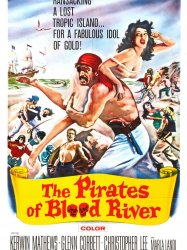
The Pirates of Blood River (1962)
, 1h27Directed by John Gilling
Origin United-kingdom
Genres Drama, Action, Adventure
Themes Seafaring films, Transport films, Pirate films
Actors Christopher Lee, Kerwin Mathews, Glenn Corbett, Oliver Reed, Peter Arne, Dennis Waterman
Roles Seymour (uncredited)
Rating60%





While in a penal colony, Huguenot Jonathan Standish (Kerwin Mathews) is captured by pirates led by Capt. LaRoche (Christopher Lee) who force him to lead them back to his home village to retrieve a treasure supposedly hidden there.

V.D. (1961)
Directed by Richard Bennett, Tom Ricketts
Genres Drama, Thriller, Comedy, Crime
Themes Medical-themed films, Films based on plays
Actors Adrienne Morrison, Dolores Faith, Richard Bennett, Charlotte Stewart, Michael Bell, John Steppling
Roles George Dupont
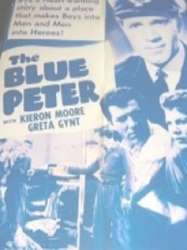
The Blue Peter (1955)
, 1h33Directed by Wolf Rilla
Origin United-kingdom
Genres Adventure
Actors Kieron Moore, Sarah Lawson, Greta Gynt, Mervyn Johns, Harry Fowler, Mary Kerridge
Roles Roger
Rating61%





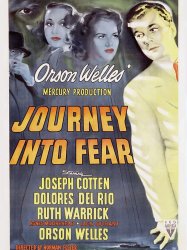
Journey into Fear (1943)
, 1h8Directed by Norman Foster, Orson Welles
Origin USA
Genres Drama, War, Thriller, Spy, Historical, Noir
Themes Spy films, Political films
Actors Joseph Cotten, Dolores del Río, Ruth Warrick, Orson Welles, Agnes Moorehead, Everett Sloane
Roles Ship's Captain
Rating64%





In an opening scene before the credits an assassin, Banat, is seen preparing a gun while a gramophone skips as it plays. The story that follows is the narrative of a letter from Howard Graham, an American armaments engineer, to his wife Stephanie. While journeying to the Soviet port of Batumi to return to the United States to complete his business with the Turkish Navy, Graham and his wife stop in Istanbul and are met by Kopeikin, a Turkish employee of Graham's company, who under the pretense of discussing business, takes Graham to a nightclub to introduce him to dancer Josette Maretl and her partner Gogo. When Banat tries to kill Graham during a magic act, he shoots the magician instead, and Graham is brought to the headquarters of the Turkish secret police for questioning. Colonel Haki of the secret police warns Graham that German agents are trying to kill him to delay the re-arming of Turkish ships. He shows Graham a photograph of Banat, whom he says was hired by a Nazi agent named Muller, and orders Graham to travel secretly to Batumi aboard a tramp steamer instead of by train. Haki assures him that he will personally see that Stephanie gets to their hotel in Batumi ahead of him.
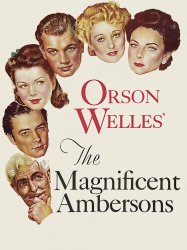
The Magnificent Ambersons (1942)
, 1h28Directed by Orson Welles, Robert Wise, Fred Fleck
Origin USA
Genres Drama, Historical, Romance
Themes Films about families
Actors Joseph Cotten, Dolores Costello, Anne Baxter, Tim Holt, Agnes Moorehead, Ray Collins
Roles Major Amberson
Rating75%





The Ambersons are by far the wealthiest family in the small midwestern city of Indianapolis. It is the turn of the 20th century, and life is peaceful. Eugene Morgan as a young man courts Isabel Amberson, but she rejects him even though she loves him. Isabel instead marries Wilbur Minafer, a passionless man she does not love. They have a child, George, whom she spoils and who becomes the terror of the town.
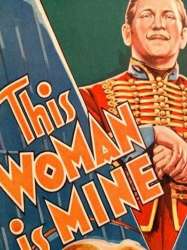
18 Minutes (1935)
, 1h28Directed by Monty Banks
Origin United-kingdom
Genres Drama
Actors Gregory Ratoff, John Loder, Benita Hume, Richard Bennett, Carl Harbord, Paul Graetz
Roles Korn
Rating59%






Nana (1934)
, 1h30Directed by Dorothy Arzner, George Fitzmaurice
Origin USA
Genres Drama
Actors Anna Sten, Lionel Atwill, Richard Bennett, Mae Clarke, Reginald Owen, Phillips Holmes
Roles Gaston Greiner
Rating59%





Nana est la coqueluche du théâtre de Paris de la Belle Époque. Elle attire beaucoup d'hommes, mais a un faible pour un officier.

The Song of Songs (1933)
, 1h30Directed by Rouben Mamoulian
Origin USA
Genres Drama, Melodrama, Romance
Themes Films based on plays
Actors Marlene Dietrich, Brian Aherne, Lionel Atwill, Alison Skipworth, Richard Bennett, Hardie Albright
Rating66%





Lily une jeune paysanne vient de perdre son père, elle est recueillie par sa tante, Madame Rasmussen, libraire à Berlin, une femme autoritaire, rigide et légèrement portée sur l'alcool. De la fenêtre de sa chambre Lily aperçoit un atelier de sculpteur qui la fascine. Un jour, Richard le sculpteur entre dans la librairie et semble captivé par le corps de Lily, il la persuade de venir poser pour elle. Acceptant après avoir hésité, Lily déjouant la surveillance de sa tante se rend chez Richard qui la convainc de se déshabiller pour prendre la pose. Bientôt une très belle sculpture prend forme et les deux jeunes gens entament une idylle. Survient alors le baron von Merzbach qui est un client de Richard et qui tombe en admiration devant la statue, il demande à être présenté à Lily. Quelque temps plus tard, le baron persuade Richard qu'avec ce dernier, Lily n'aura aucun avenir, alors qu'avec lui, elle aura la reconnaissance, la fortune, le titre…par lâcheté Richard accepte. Le soir alors que Lily s'apprête à se rendre chez Richard, Madame Rasmussen la surprend et la chasse de son domicile. Elle se rend chez Richard, mais celui-ci a disparu, et c'est alors le baron von Merzbach qui l'accueille à sa place en lui apprenant que Richard est parti en voyage. Le baron-ci lui propose le mariage, désorientée et choquée, Lily accepte. Elle fait son éducation dans le grand monde, apprend la musique, le français, la danse mais n'est pas heureuse. Von Prell le palefrenier du baron s'éprend d'elle et lui déclare sa flemme pendant une leçon d'équitation, Lily le rabroue.

Big Executive (1933)
, 1h10Directed by Erle C. Kenton
Origin USA
Genres Drama, Romance
Actors Ricardo Cortez, Richard Bennett, Sharon Lynn, Dorothy Peterson, Barton MacLane, Charles Middleton
Roles Commodore Richardson

If I Had a Million (1932)
, 1h28Directed by Ernst Lubitsch, James Cruze, Norman Taurog, Norman Z. McLeod, William A. Seiter, H. Bruce Humberstone, Stephen Roberts, Lothar Mendes
Origin USA
Genres Drama, Comedy
Themes Films about sexuality, Erotic films, Films about prostitution, Erotic thriller films
Actors Gary Cooper, Charles Laughton, George Raft, May Robson, W. C. Fields, Richard Bennett
Roles John Glidden
Rating68%





Dying industrial tycoon John Glidden (Richard Bennett) cannot decide what to do with his wealth. He despises his money-hungry relatives and believes none of his employees is capable of running his various companies. Finally, he decides to give a million dollars each to eight people picked at random from a telephone directory before he passes away, so as to avoid his will being contested. (The first name selected is John D. Rockefeller, which is swiftly rejected.)

Madame Racketeer (1932)
, 1h12Directed by Alexander Hall
Origin USA
Genres Comedy
Actors Alison Skipworth, Richard Bennett, George Raft, Gertrude Dolores Messinger, Evalyn Knapp, Robert McWade
Roles Elmer Hicks
Rating64%






This Reckless Age (1932)
, 1h20Directed by Frank Tuttle
Origin USA
Genres Comedy
Themes Films based on plays
Actors Buddy Rogers, Richard Bennett, Peggy Shannon, Charles Ruggles, Frances Dee, Frances Starr
Roles Donald Ingals
Rating69%






Strange Justice (1932)
, 1h4Directed by Victor Schertzinger
Origin USA
Genres Drama
Actors Marian Marsh, Reginald Denny, Richard Bennett, Norman Foster, Irving Pichel, Nydia Westman
Roles Kearney
Rating57%





This script must be run from the command line

Arrowsmith (1931)
, 1h48Directed by John Ford
Origin USA
Genres Drama
Themes Seafaring films, Transport films
Actors Ronald Colman, Helen Hayes, Richard Bennett, Myrna Loy, Alec B. Francis, Beulah Bondi
Roles Gustav Sondelius
Rating62%





An idealistic young medical student named Martin Arrowsmith (Ronald Colman) makes a favorable impression on Dr. Max Gottlieb (A. E. Anson). When Arrowsmith graduates, Gottlieb offers him a position as his research assistant, but the young man reluctantly has to turn him down. He has fallen in love with nurse Leora (Helen Hayes), and the salary is not enough to support the couple. Instead, he marries Leora and sets up his medical practice in her rural home town. One day, he develops a serum to cure a fatal cow disease ravaging the nearby herds. Reinvigorated, he decides to join Gottlieb at the McGurk Institute in New York. Meanwhile, Leora miscarries and, to the couple's sorrow, is unable to have any more children, so she devotes herself to supporting her husband's mission.
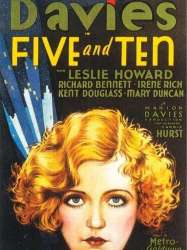
Five and Ten (1931)
, 1h29Directed by Robert Z. Leonard
Origin USA
Genres Drama, Romance
Actors Leslie Howard, Richard Bennett, Marion Davies, Irene Rich, Douglass Montgomery, Halliwell Hobbes
Roles John Rarick
Rating63%





John Rarick, devenu l'un des hommes les plus riches d'Amérique grâce à sa chaîne de magasins populaires, déménage avec sa famille du Kansas à New York. Obsédé par le travail, il ne remarque pas que sa femme Jenny et son fils Avery sont malheureux et regrettent la vie simple du Kansas. Seule sa fille Jennifer aime New York et essaie désespérément de faire partie de l'élite sociale de la ville, même s'ils la snobent à cause de son origine sociale. Lors d'un gala de charité, elle rencontre Berry Rhodes et décide immédiatement de l'épouser, même s'il est déjà fiancé à Muriel Preston. Lorsqu'elle découvre que Berry est un architecte talentueux, elle convainc Rarick de l'engager pour construire une nouvelle tour de bureaux pour son entreprise. Berry rejette d'abord les avances de Jennifer mais finit par se rendre compte qu'il l'aime. Ils prévoient de se rencontrer dans le jardin, mais avant que Berry n'arrive, Jennifer est confrontée à Muriel qui lui dit qu'elle ne peut pas acheter Berry de la même façon qu'elle achète son chemin dans la société. Lorsque Muriel raconte la conversation à Berry, elle déforme les paroles de Jennifer. Peu de temps après, Muriel et Berry se marient.
 Connection
Connection

